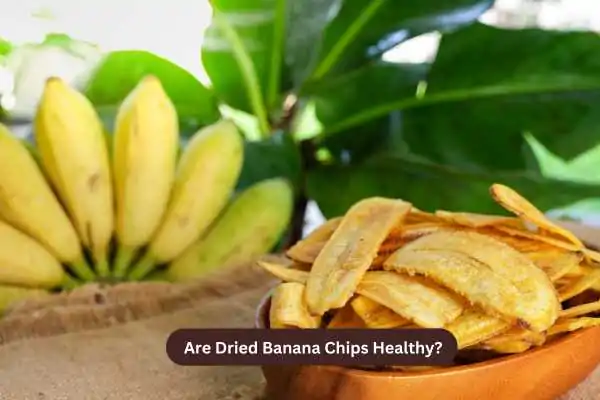Banana chips are a familiar snack in the UK, often found in supermarkets, health food shops, and even mixed into trail mixes. They are crunchy, naturally sweet, and convenient to carry around. But a common question arises: are dried banana chips actually healthy, or are they just another sugary snack in disguise?

In this article, we’ll break down the nutritional value of dried banana chips, explore their potential health benefits, highlight their drawbacks, and share tips on how to enjoy them wisely.
What Are Dried Banana Chips?
Dried banana chips are slices of banana that have been dehydrated or fried until crisp. There are generally two main varieties available in the UK:
-
Dehydrated banana chips – These are made by slowly removing water content from banana slices using heat or air-drying. They tend to be lighter in texture and have no added oil.
-
Fried banana chips – These are prepared by deep-frying banana slices in oil, often coconut or palm oil, and may be coated with sugar or honey for extra sweetness.
The difference in preparation methods plays a big role in how healthy (or unhealthy) these snacks are.
Nutritional Profile of Dried Banana Chips
The nutrition of banana chips depends heavily on how they’re made. On average, a 100g serving of fried banana chips provides:
-
Calories: 520–550 kcal
-
Fat: 30–35 g (often saturated)
-
Carbohydrates: 55–60 g
-
Sugar: 25–35 g
-
Fibre: 7–9 g
-
Protein: 2–3 g
In comparison, dehydrated banana chips without added oil or sugar will be significantly lower in calories and fat, though still relatively high in natural sugars.
Potential Health Benefits
1. Good Source of Fibre
Bananas, even when dried, contain dietary fibre that supports digestion and helps regulate bowel movements. Fibre also promotes a feeling of fullness, which can reduce the likelihood of overeating.
2. Natural Energy Boost
With their high carbohydrate content, banana chips provide quick energy. This makes them suitable for hikers, athletes, or anyone needing a convenient energy-dense snack.
3. Potassium and Micronutrients
Bananas are naturally rich in potassium, an essential mineral that supports heart health, blood pressure regulation, and muscle function. Some vitamins, like vitamin B6, remain present in dried bananas as well.
4. Long Shelf Life and Convenience
Unlike fresh bananas, dried banana chips can be stored for months. They’re easy to pack in lunchboxes or take on trips without worrying about spoilage.
The Drawbacks of Dried Banana Chips
While there are health benefits, banana chips also have significant downsides:
1. High in Calories
Because water is removed during drying or frying, banana chips become calorie-dense. A small handful may contain as many calories as a whole fresh banana, making it easy to overconsume.
2. Added Sugar
Many commercial banana chips are coated in sugar or honey to enhance flavour. This increases the sugar content, which may contribute to weight gain and blood sugar spikes if eaten in excess.
3. High in Unhealthy Fats
Fried banana chips often use oils high in saturated fat, such as palm or coconut oil. Excessive intake of saturated fat can raise cholesterol levels and increase the risk of heart disease.
4. Loss of Nutrients
Some water-soluble vitamins, like vitamin C, are reduced or lost during the drying process. This makes banana chips less nutrient-dense compared to fresh bananas.
Healthier Alternatives and Choices
If you enjoy banana chips, you don’t necessarily need to cut them out completely. Instead, choose smarter options:
-
Look for oven-dried or air-dried banana chips without added sugar or oil.
-
Check labels carefully to avoid products high in saturated fat or added sweeteners.
-
Make your own at home by baking thin slices of banana at a low temperature until crisp.
Homemade versions allow you to control the ingredients and avoid unnecessary additives.
How to Enjoy Banana Chips in Moderation
Dried banana chips can be part of a balanced diet if eaten in moderation. Here are some tips:
-
Use as a topping – Sprinkle a few chips on yoghurt, porridge, or smoothie bowls for crunch.
-
Mix with nuts and seeds – Combine unsweetened banana chips with almonds, walnuts, or sunflower seeds for a balanced trail mix.
-
Mind portion sizes – Stick to a small handful (around 30g) to avoid excess calories and sugar.
-
Pair with protein – Eat banana chips with a protein-rich food like Greek yoghurt or cottage cheese to balance blood sugar levels.
Final Thoughts
So, are dried banana chips healthy? The answer depends on the type you choose and how much you eat. Air-dried banana chips without added sugar or oil can be a nutritious, fibre-rich snack, while fried versions loaded with fat and sugar are closer to a treat than a health food.
For those in the UK looking for convenient snacks, dried banana chips can fit into a balanced diet when enjoyed in moderation. However, fresh bananas remain the healthier choice overall—lower in calories, free from added sugars, and packed with more nutrients. If you love the crunch of banana chips, go for minimally processed varieties or make your own at home. That way, you can enjoy the sweet taste of bananas without the hidden downsides.

